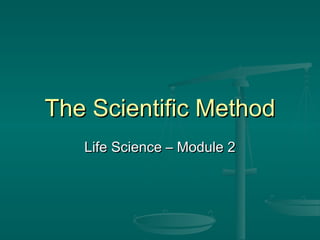
Module 2 the scientific method
- 1. The Scientific MethodThe Scientific Method Life Science – Module 2Life Science – Module 2
- 2. Scientific MethodScientific Method What is the Scientific Method?What is the Scientific Method? It is aIt is a processprocess that is used to findthat is used to find answersanswers to questions about the worldto questions about the world around us.around us.
- 3. Is there only one “scientific method”?Is there only one “scientific method”? No, there are several versions of theNo, there are several versions of the scientific method.scientific method. Some versions have moreSome versions have more stepssteps, while, while others may have only a few.others may have only a few.
- 4. However, they all begin with theHowever, they all begin with the identification of aidentification of a problemproblem or aor a questionquestion to be answered based on observations ofto be answered based on observations of the world around us and provide anthe world around us and provide an organizedorganized method for conducting andmethod for conducting and analyzing an experiment.analyzing an experiment.
- 5. HypothesisHypothesis What is a hypothesis?What is a hypothesis? It is anIt is an educated guesseducated guess based onbased on observations and your knowledge of theobservations and your knowledge of the topic.topic.
- 6. DataData What is data?What is data? It isIt is informationinformation gathered during thegathered during the experiment.experiment.
- 7. Identify the ProblemIdentify the Problem What do you want to know or explain?What do you want to know or explain? Use observations you have made to write aUse observations you have made to write a question that addresses the problem orquestion that addresses the problem or topic you want to investigate.topic you want to investigate.
- 8. Form a HypothesisForm a Hypothesis What do you think will happen? Predict theWhat do you think will happen? Predict the answer to your question or the outcome ofanswer to your question or the outcome of the experiment.the experiment. Write it in a form of a statement!Write it in a form of a statement!
- 9. Create an ExperimentCreate an Experiment How will you test your hypothesis? DevelopHow will you test your hypothesis? Develop a procedure for a reliable experiment anda procedure for a reliable experiment and address safety rules.address safety rules.
- 10. Perform an ExperimentPerform an Experiment Follow the steps in your procedure toFollow the steps in your procedure to perform your experiment. Record dataperform your experiment. Record data and observations!and observations!
- 11. Analyze the DataAnalyze the Data Is the data reliable? Does your data andIs the data reliable? Does your data and observations from the experiment supportobservations from the experiment support your hypothesis?your hypothesis?
- 12. If yes…If yes… Communicate the ResultsCommunicate the Results Write a conclusion that summarizes theWrite a conclusion that summarizes the important parts of your experiment and theimportant parts of your experiment and the results.results.
- 13. If no…If no… Is your data inaccurate or the experimentIs your data inaccurate or the experiment flawed?flawed? Modify the ExperimentModify the Experiment Rewrite your procedure to address the flawsRewrite your procedure to address the flaws in the original experimentin the original experiment
- 14. Introduction to Science and theIntroduction to Science and the Scientific MethodScientific Method The goal of science is to investigate andThe goal of science is to investigate and understand the natural world, to explainunderstand the natural world, to explain events in the natural world, and to useevents in the natural world, and to use those explanations to make usefulthose explanations to make useful predictionspredictions
- 15. ScienceScience 1.1. Science deals only with the natural world.Science deals only with the natural world. 2.2. Scientists collect and organize information in aScientists collect and organize information in a careful, orderly way, looking for patterns andcareful, orderly way, looking for patterns and connections between events.connections between events. 3.3. Scientists propose explanations that can beScientists propose explanations that can be tested by examining evidencetested by examining evidence 4.4. Science is an organized way of using evidenceScience is an organized way of using evidence to learn about the natural world.to learn about the natural world.
- 16. How is Science Done?How is Science Done? 1.1. Science begins with observations. ThisScience begins with observations. This is the process of gathering informationis the process of gathering information about events or processed in a careful,about events or processed in a careful, orderly way.orderly way. 2.2. Data is the information gathered fromData is the information gathered from making observations.making observations.
- 17. 3.3. There are two types of data:There are two types of data: a.a. Quantitative data are numbers and areQuantitative data are numbers and are obtained by counting or measuring.obtained by counting or measuring. b.b. Qualitative data are descriptions and involveQualitative data are descriptions and involve characteristics that cannot be counted.characteristics that cannot be counted.
- 18. 4.4. HypothesisHypothesis a. A hypothesis is a scientifica. A hypothesis is a scientific explanation for a set of observationsexplanation for a set of observations b. A hypothesis must be stated in a wayb. A hypothesis must be stated in a way that makes it “testable”. The hypothesisthat makes it “testable”. The hypothesis is just a possible answer to a question,is just a possible answer to a question, and it must be thoroughly tested.and it must be thoroughly tested.
- 19. Scientific MethodsScientific Methods The scientific method is a series of stepsThe scientific method is a series of steps used by scientists to solve a problem orused by scientists to solve a problem or answer a question.answer a question.